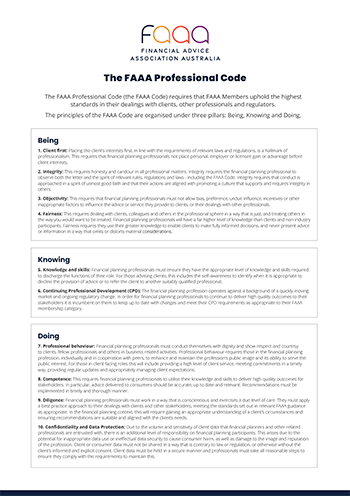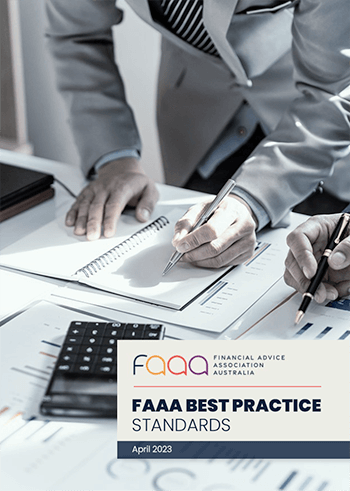Member Regulations
FAAA Professional Code
Our world class Professional Code is a key component of our Professional Framework, along with our Best Practice Standards and wider FAAA member guidance.
The Framework fosters both high professional standards and consumer protection. We are dedicated to helping FAAA members understand the Code and how best to provide professional services to their clients. Breaches of the FAAA Professional Code are taken seriously by the FAAA and may result in a member being subject to our Disciplinary Process.
FAAA members are bound by the FAAA Professional Code, which brings together a comprehensive set of ethical principles.
The FAAA Professional Code is a continuation of the previous FAAA Professional Code. This document will serve as the interim Code whilst the FAAA undertakes Member consultation to assess whether the Code should continue in its current format.
Professionalism for FAAA members
FAAA members are bound by the FAAA Professional Code which brings together a comprehensive set of ethical principles, practice standards and conduct rules.
The professional provision of financial planning or related services is a role imbued with trust and confidence in the Australian community. Financial planners are entrusted with their clients’ financial security and have the capacity, through their professional engagements to profoundly influence their clients’ financial future.
How an FAAA member manages his or her relationship with the client and conducts him or herself professionally during the course of a client engagement is of critical importance professionally.
All FAAA members must:
- Identify and act in accordance with their duties both to the profession and to the public interest the profession serves.
- Avoid situations and conduct which reflects adversely on their integrity or fitness as a financial planner, membership of the financial planning profession and the FAAA, or upon the FAAA.

The FAAA Professional Code
FAAA members are bound by the FAAA Professional Code, which brings together a comprehensive set of ethical principles.
Download and print your copy of the FAAA Professional Code.
Code guidance
From time to time, the FAAA issues guidance in relation to the whole of any part of the FAAA Professional Code and may elaborate on its application. The Guidance is an enforceable component of the Code.
Breaches of the Code
Our members play an important role in ensuring we maintain high standards within the FAAA membership. If you suspect that another member may have breached the Code, we ask that you let us know by email to [email protected].

FAAA Best Practice Standards
Download the FAAA Best Practice Standards document.
To support practitioner members in applying the Professional Code in practice, the FAAA provides the Best Practice Standards, which set out guidance as to how to provide the Code in day-to-day practice. As the financial planning landscape changes, we update the Best Practice Standards to ensure it remains relevant to the regulatory environment at the time.
FAAA Professional Code FAQs
Following the release of the FAAA Professional Code, we felt it would be helpful to provide answers to some of the questions we have received regarding the updated Code, and how it applied to our members.
If you have a question on the Professional Code please feel free to email the Professionalism Team’s dedicated inbox [email protected].
The Professional Code applies to all FAAA Members.
The Best Practice Standards Guidance is non enforceable guidance issued to members to assist them in understanding their obligations under the Professional Code.
FAAA members are rightly proud of their membership and the high standards of conduct this implies. To ensure that the reputation of FAAA Members is not impacted by inappropriate conduct of any individual member, the FAAA maintains a dedicated Professional Standards Team to investigate and review member conduct. Where the FAAA has concerns regarding the conduct of one of its members (usually because of a referral from another FAAA member or because of a complaint from a consumer) the Professional Standards Team will contact the member in question, set out the reason for the concerns and the evidence we have received, to enable the member to set out their response to the issues raised. There then may be further questions and requests for evidence, drawn from a number of sources. The Professional Standards Team will then form a view as to whether the evidence shows that the member’s conduct breaches the FAAA Code. If a potential breach of the Code is identified the Professional Standards Team will prepare a report for the Conduct Review Commission.
The Chair of the Conduct Review Commission will decide whether to initiate formal disciplinary proceedings. In the event that these go forward the Conduct Review Commission will convene a disciplinary panel. This is comprised of one of either the Chair or Deputy Chairs of the Conduct Review Commission, and two practitioner members. This means that the Conduct of members is reviewed by members.
Please reach out to the FAAA Professionalism team via email at [email protected], who will be happy to help.
Conduct and Integrity oversight
FAAA Members hold themselves to a high standard of professional conduct. We consistently receive feedback from Members that they expect their association to ensure that those standards are met by their peers in the association. This is reflected in the very small proportion of FAAA members who are subject to ASIC enforcement and disciplinary action from year to year. Whilst the FAAA receives a very small number of reports of unethical or unprofessional conduct each year (involving less than 0.1% of our membership), a significant proportion of the reports we do received are referred by other FAAA members, who are concerned that a fellow member’s actions may not have met the duty to their client, or the wider duty to the profession or the public trust.
In order to ensure that Members continue to meet the high standards that they expect of each other, the FAAA maintains a Professional Standards function, as well as an independent conduct panel (the Conduct Review Commission – CRC) to oversee members actions and investigate concerns that conduct has fallen below the required standard.
Where a report or complaint is received, we follow a fair and robust process to investigate and – where necessary – take appropriate action. Details of this can be found here.
Financial Advice Association of Australia (FAAA) Constitution
The FAAA Constitution outlines how the FAAA, in conjunction with its member elected Board, should conduct its operations. The Constitution also imposes certain requirements on the FAAA in terms of the publication of reports and regulations.
Membership Regulation
The FAAA Membership Regulation, in conjunction with the FAAA Constitution, sets out the obligations and rights and privileges of each sub-category of membership, identifies eligibility criteria and elaborates on membership requirements.
Regulation 02/04 – use of the FAAA brand and CFP® marks
This regulation explains the use of the FAAA brand by members, including the use of CERTIFIED FINANCIAL PLANNER®, CFP®, Financial Planner AFP® trademarks and associated logos.
Discipline
Conduct Review Commission (CRC)
The CRC is an independent body put in place to ensure members are held accountable to the FAAA Professional Code. The CRC plays a vital role in regulating the conduct of FAAA members and upholding the highest ethical standards within the financial profession.
The key functions of the CRC are the following:
- Determining whether disciplinary proceedings should commence against members
- Hearing and determining complaints against members in respect of breaches
- Hearing and determining appeals.
The CRC has considered various aspects of the FPA Disciplinary Regulations, and in an attempt to clarify particular elements of the regulations have issued the following guidance notes for members and complainants.
Read Guidance Note – No 1/2019 Minor instances of unsatisfactory conduct
The CRC is made up of experienced members of the financial planning profession, relevant experts and members of the public. The CRC may comprise up to 15 members, including the Chair and a Deputy Chair(s) each of which are appointed for a term of up to three years. The role of CRC Chair is typically held by a legally trained professional.
- Gregory Burton SC (CRC Chair)
- Graham McDonald (CRC Deputy Chair)
- Phil Davies (CRC Deputy Chair)
- Michael Chalmers CFP®
- Gregory Cook CFP® LRS®
- Cherie Feher CFP® LRS®
- Dacian Moses CFP®
- Lisa Palmer CFP®
- Ragnhild Sky CFP®
- Michael Miller CFP®
- Shane Nicholas CFP®
Conduct and integrity regulations
Our disciplinary process was put in place as a formal mechanism to investigate complaints against FAAA members. Members who are found to have breached the Code may be sanctioned under the FAAA Conduct and Integrity Regulations. Decisions about whether an FAAA member has breached the Code and whether they should be sanctioned under the Regulations are made by the Conduct Review Commission.
The FAAA Conduct and Integrity Regulations set out the process by which the FAAA handles and investigates complaints made against Members. The Regulations follow a strict framework that allows for fairness and natural justice to be afforded to both a Complainant and Member. The Regulations set out the process of making a complaint, the various powers of the FAAA Investigating Officer, and how the FAAA interacts with the Conduct Review Commission. The Regulations also address the possible outcomes of a Complaint and the sanctions that could apply to Members if a breach of the FAAA Professional Code is proven.
The FAAA has published a reference guide that condenses the complaints process into plain English for those Members subject to a complaint and investigation with the FAAA.
Financial Advice Association of Australia (FAAA) Constitution
The FAAA Constitution outlines how the FAAA, in conjunction with an elected Board and Executive team, should conduct its operations. The Constitution also imposes certain requirements on the FAAA in terms of the publication of reports and regulations.Membership Regulation
The FAAA Membership Regulation, in conjunctions with the FAAA Constitution, sets out the obligations and rights and privileges of each sub-category of membership, identifies eligibility criteria and elaborates on membership requirements.
Regulation 02/04 – using the CFP® Marks
This regulation explains the use of the FAAA brand by members, including the use of CERTIFIED FINANCIAL PLANNER®, CFP®, Financial Planner AFP® trademarks and associated logos.
Please note, the current version of Regulation 02/04 will be updated to reflect FAAA branding during May 2023.
Committees
Professional Standards and Conduct Committee
The FAAA Professional Standards and Conduct Committee is charged with the responsibility for maintaining and regularly reviewing the Code to keep it alive to the current issues of practice. Professional peers on the committee continue to welcome member comments and feedback on operational aspects of the Code.
The Committee has the purpose of advising the FAAA Board on strategies, activities and policies that will ensure the FAAA operates effectively as a Professional Organisation, acting to build trust and confidence in the professionalism and services of its members.
Any questions?
Please email or call our Professional Standards team on 1300 337 301.